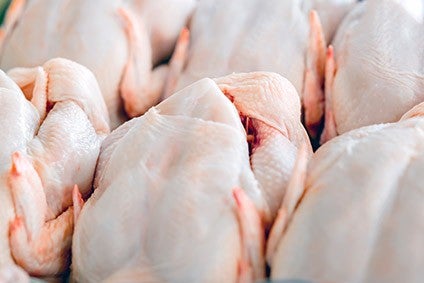
The British Poultry Council has defended its corner over its objections to the potential import of chlorine-soaked chicken and hormone-treated beef from the US under any post-Brexit trade deal.
Roger Johnson, president of the US farming body the National Farmers’ Union, accused the UK of ”fear-mongering” in an interview with the BBC last week over the industry’s disapproval that such products be allowed into the UK.

Discover B2B Marketing That Performs
Combine business intelligence and editorial excellence to reach engaged professionals across 36 leading media platforms.
UK Environment Secretary Michael Gove ruled last year that imports of chlorine-soaked chicken would not be permitted into Britain from the US as part of the post-Brexit negotiations, overriding his trade counterpart Liam Fox who was said to be in favour.
While chicken soaked in chlorine is allowed in the US and the practise has been deemed safe by the European Food Safety Authority, the European Union has banned such imports.
Johnson argued in the BBC interview that imports of chlorine-soaked chicken and hormone-treated beef into the UK should be allowed, adding that US food is ”perfectly safe”, although he conceded that the US was more ”risk tolerant”. He contested the idea that just because his country permits such practises, it does not mean the US has lower standards.
”The trade negotiations need to figure out a way to allow both of these standards to be used and in a way that is honest and truthful, and let consumers choose,” Johnson said.

US Tariffs are shifting - will you react or anticipate?
Don’t let policy changes catch you off guard. Stay proactive with real-time data and expert analysis.
By GlobalDataHis comments drew a response from British Poultry Council (BPC) chief executive Richard Griffiths, who in July last year advocated the importance of backing UK farmers in any post-Brexit trade deal, which he stressed must ensure the security and safety of British food and the country’s reputation over standards.
Faced with the latest of counter objections from the US, this time the National Farmers’ Union, Griffiths said in an article posted on the BPC’s website: ”This time it’s America’s National Farmers Union saying that we’re ‘fear-mongering’ over their use of chemicals to clean-up food or their injecting hormones to increase growth.
”It’s “perfectly safe” they say, and yes, it is, but that has never been the objection. Our issue has always been that US production doesn’t meet our standards and our values for meat production.”
Griffiths went on to outline a number of differences between the UK and the US in his article posted on 27 April, which reiterated points previously made by the ADAS Farming Association, namely encompassing animal welfare, feed, slaughter, carcass cleaning and country of origin.
”The UK/EU has multiple pieces of national legislation aimed at various aspects of animal welfare,” Griffiths commented on one of the categories. ”The US has no national welfare legislation covering farm animal welfare.”
With respect to the cleaning of animal carcasses, the BPC CEO said the UK and EU only allow the use of potable water, while the US permits the use of ”approved (food safe) chemicals to be used in the decontamination of carcasses”.





